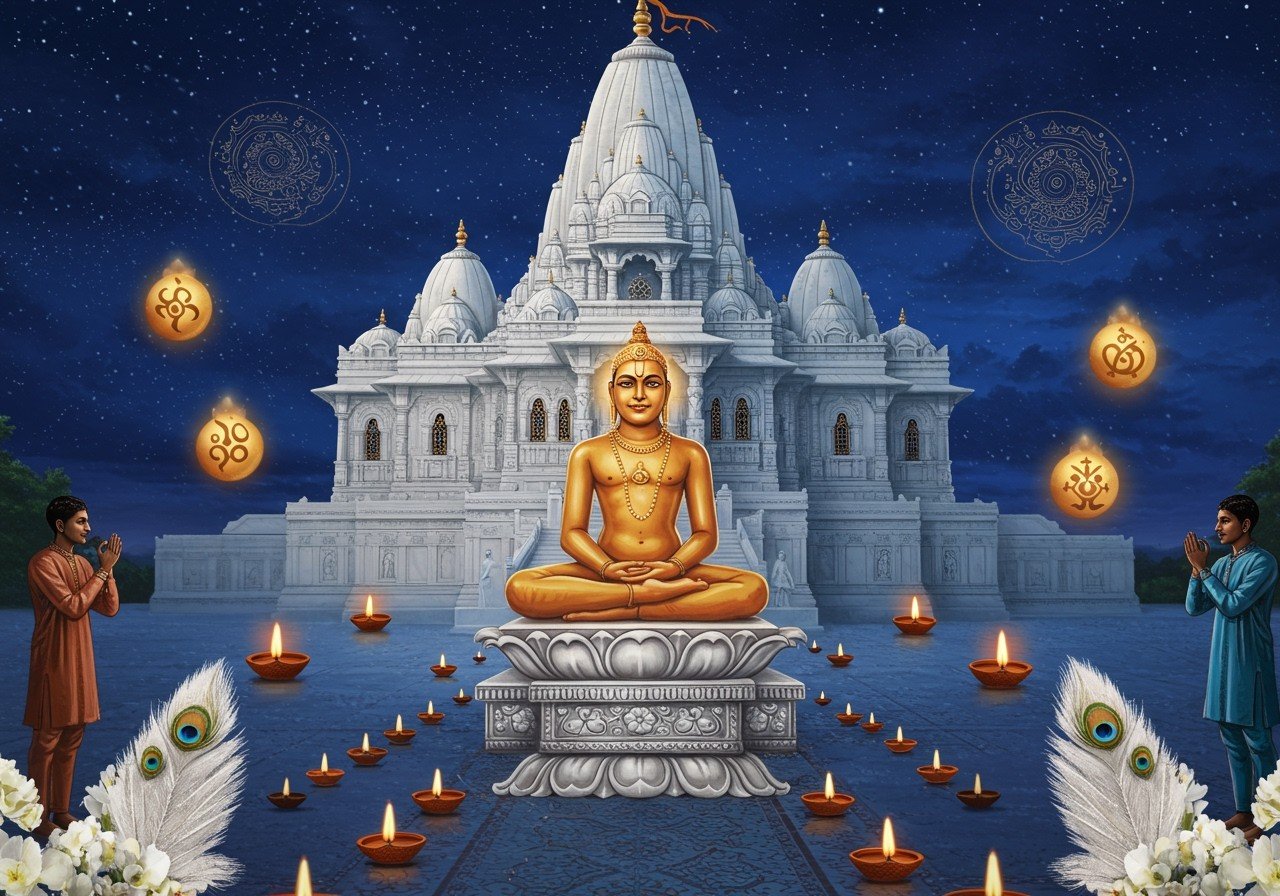
Jainism, one of the world’s oldest religions, holds a profound and enduring presence in India. This blog explores the rich tapestry of Jainism, from its ancient origins to its modern-day influence. We’ll uncover its core tenets, trace its historical milestones, and examine its contemporary impact on Indian culture and society.
Origins and Core Beliefs of Jainism
Originating in the Indus Valley Civilization, Jainism stands as one of the most ancient religions known to humankind. Its history is interwoven with the teachings of twenty-four Tirthankaras, with Mahavira being the most recent and prominent. The core principles of Jainism provide a framework for ethical living and spiritual growth:
- Ahimsa (Non-violence): This principle extends beyond physical harm to encompass the avoidance of any harm in thought, word, or deed. It promotes compassion and respect for all living beings, influencing dietary choices and daily interactions.
- Aparigraha (Non-attachment): This principle encourages detachment from material possessions and worldly desires. It emphasizes the importance of inner peace and contentment over external acquisitions, fostering a simpler, more meaningful life.
- Anekantavada (Multiple Viewpoints): This principle acknowledges the complexity of truth and encourages open-mindedness and tolerance. It promotes understanding diverse perspectives and respecting the validity of different viewpoints.
The concept of Karma is central to Jain philosophy, influencing actions and future consequences. Jain scriptures, such as the Agamas and Siddhantas, hold deep significance, guiding followers on the path to liberation. Monks and nuns play a crucial role in preserving and disseminating Jain teachings, while rituals and festivals like Paryushana and Diwali hold great importance in Jain practice.
Historical Milestones in Jainism
Jainism’s early spread can be traced back to the Mauryan Empire under Emperor Chandragupta Maurya. King Kharavela of Kalinga also played a significant role in promoting Jainism. The religion has profoundly influenced Indian art and architecture, as seen in the rock-cut caves at Ellora and the temples at Mount Abu. Jain literature, written in Prakrit and Sanskrit, has made significant contributions to Indian literary heritage. The interaction of Jainism with Buddhism and Hinduism has enriched Indian philosophy. While Jainism experienced a decline in North India, it saw a revival in the South, particularly in Karnataka and Tamil Nadu. Notable Jain scholars have made invaluable contributions to mathematics, astronomy, and ethics. The ninth to twelfth centuries A.D. marked a golden period for Jainism.
Jainism’s Presence in Modern India
Jainism continues to flourish in modern India, with substantial communities in Gujarat, Maharashtra, Rajasthan, and Karnataka. Jain business communities, such as the Marwaris and Gujaratis, play a vital role in the Indian economy. Jain philanthropists and institutions contribute significantly to education, healthcare, and social welfare. Important Jain temples and pilgrimage sites, including Palitana, Shatrunjaya, and Shravanabelagola, draw devotees from around the world. Jain principles promote vegetarianism and environmental conservation, aligning with contemporary concerns about sustainability. Jain values also influence Indian politics, particularly in promoting non-violence and ethical governance. Organizations like the Jain International Trade Organization (JITO) play a key role in raising awareness about Jain principles and practices.
Cultural and Social Impact of Jainism
Jainism’s rich heritage has deeply influenced Indian culture and society. Its emphasis on non-violence and vegetarianism has shaped Indian cuisine, with Jain food being strictly vegetarian and often sattvic, promoting purity and health. Many Indians adopt Jain principles in their diets, avoiding harm to living beings.
Art and Iconography
Jain art and iconography have left an enduring mark on Indian culture. Symbols like the Swastika and Om are central to Jain practices. Jain temples, such as the Dilwara Temples in Mount Abu, are renowned for their intricate carvings and detailed architecture, reflecting spiritual beliefs and artistic excellence.
Festivals and Traditions
Jain festivals like Paryushana and Diwali, which marks the Nirvana of Lord Mahavira, are celebrated with great devotion. These festivals strengthen community bonds and encourage spiritual reflection.
Gender Equality and Education
Jainism promotes gender equality and encourages education for women. Many Jain women have been prominent scholars and leaders, contributing significantly to religious and social spheres.
Literature and Performing Arts
Jain literature in Prakrit and Sanskrit enriches Indian literary heritage. Jain poets and writers have contributed to classical music and theatre, sharing tales of morality and ethics.
Interfaith Dialogue
Jainism fosters interfaith dialogue and communal harmony. Its principles of non-violence resonate with various faiths, promoting peace and understanding.
Environmental Conservation
Jain principles advocate environmental conservation. The belief in Ahimsa extends to protecting nature, influencing policies and practices in India. Jain communities actively engage in sustainable living.
How Poojn.in Supports Your Jain Spiritual Journey
Poojn.in, India’s leading online store for cultural and religious goods, provides a dedicated collection of authentic Jain items. We understand the importance of having access to pure and sanctified products for your spiritual practices. Our platform offers a convenient way to acquire traditional Jain puja items, ensuring quality and adherence to Jain principles.
Explore our Bel malas, Tulsi malas, Shiva Lingams, and other sacred items that resonate with Jain traditions.
Conclusion
Jainism’s influence on Indian culture and society is undeniable. Its teachings of non-violence, compassion, and ethical conduct have shaped various aspects of Indian life. From its ancient origins to its modern presence, Jainism continues to inspire individuals and communities to strive for a more peaceful and harmonious world. Its principles remain relevant in contemporary society, offering guidance on sustainable living, ethical decision-making, and spiritual growth.
FAQs on Jainism
What is Jainism? Jainism is an ancient Indian religion emphasizing non-violence, self-discipline, and the pursuit of liberation from the cycle of rebirth. It originated in India and is based on the teachings of twenty-four Tirthankaras, spiritual teachers who have achieved enlightenment.
How old is Jainism? Jainism is one of the oldest living religions in the world, with its origins tracing back over 2,500 years. Its philosophical foundations were established well before the 6th century BCE, the time of Lord Mahavira.
What are the main principles of Jainism? The three core principles are Ahimsa (non-violence), Aparigraha (non-attachment), and Anekantavada (multiple viewpoints). These principles guide Jains towards a life of spiritual purity and ethical conduct.
How many Jains are there in India? India is home to the largest Jain population globally, with over four million adherents. Jain communities thrive in various states across the country.
What are some important Jain festivals? Key Jain festivals include Mahavir Jayanti, celebrating the birth of Lord Mahavira, and Paryushana, an eight-day period of fasting, reflection, and spiritual renewal. Diwali is also observed by Jains, marking the liberation of Lord Mahavira.
How does Jainism influence modern Indian society? Jainism’s emphasis on non-violence, ethical business practices, and philanthropy has significantly impacted modern Indian society. Jain communities contribute actively to social welfare and economic development.
Are there Jain temples in India? Yes, India boasts numerous magnificent Jain temples, often renowned for their intricate architecture and spiritual significance. Prominent examples include the Dilwara Temples in Mount Abu, Rajasthan, and the Palitana temples in Gujarat.
Can anyone follow Jainism? Jainism is open to anyone who resonates with its teachings and is willing to embrace its principles. The path to Jainism involves adopting a lifestyle centered on non-violence, self-discipline, and the pursuit of spiritual growth.


